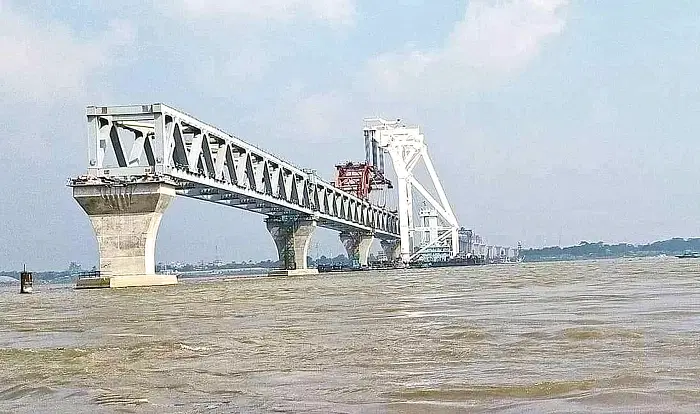
Work on the Padma bridge project had already been set back due to changes in the design and delays in river training. And now, over the past four months, it has not been possible to put the steel spans in place due to the coronavirus outbreak and strong current caused by the floods. So work on the bridge has been delayed yet another time.
With the strong current somewhat abating, one span could be put in place on Sunday at the Mawa end of the bridge.
With these delays hampering the progress in the work, it is uncertain as to whether the bridge will be ready by December next year. These delays have also increased costs.
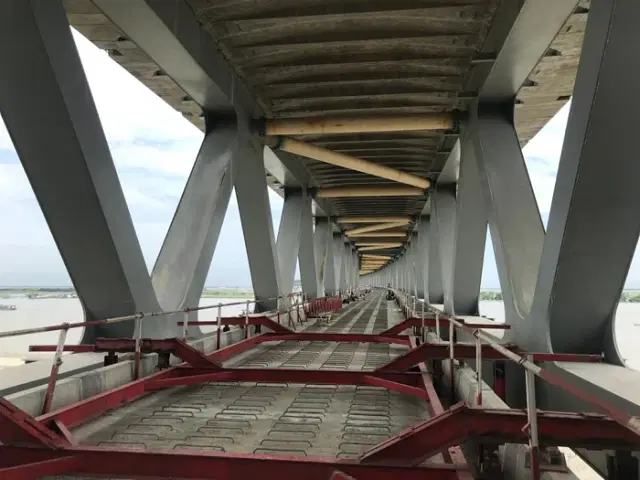
So far 32 spans have been placed on the pillars and 4.80km of the bridge is visible. The remaining 9 spans will all be placed at the Mawa end of the bridge.
Once all the spans are attached to the pillars, the railway line will have be set up. The road will also have to be completed for vehicular movement. Only then will the bridge be ready for use.
Sources associated with the implementation of the Padma Bridge project said that the contractors are not accepting liability for the delay in completion of the work. They say that the work has been delayed because of the change in design related to piling of 22 pillars, delay in river training, river erosion and strong current. The government has accepted their claims. So it is the government that bears the entire responsibility for the added time.
The government is having to bear the losses caused by price escalation of goods due to the delay. Bangladesh will also have to bear the expenses for the workforce being used by the contractors in this extended time. The contracting company is even demanding costs for the use of construction equipment. In all, both time and costs on the bridge have escalated.
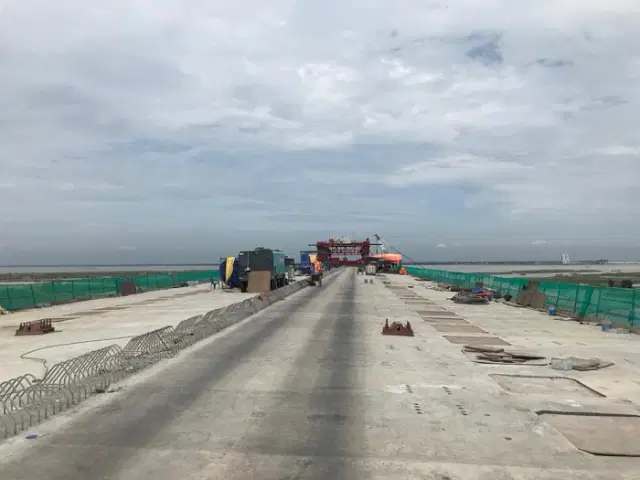
The Chinese contractors, China Major Bridge Engineering Company, are carrying out the work on the main bridge. Sinohydro Corporation, another Chinese company, has been given the river training contract. They were issued a letter in November 2014 to start work and were supposed to have completed it in four years, by 2018.
Projects papers show that the bridge authorities have given the contractors an extra two years and nine months to complete work on the main bridge. The river training contractors have also been given two and a half years added time. The reasons stated for granting the extended time are not handing the land over the contractors in time, river erosion and a deep hollow forming in the river bed.
Delay in projects means increase in expenditure. Delaying work once the contract is signed, claiming compensation – these are all old tricks of the contractors. Experts had warned of all this in advance and now all that is happening
An official of the bridges division, on condition of anonymity, told Prothom Alo that the three years and nine month time extension was made due to problems in the past. The contractors may be given additional time yet again next year due to the coronavirus outbreak and also the strong current causes by floods. Time on river training may also be extended.
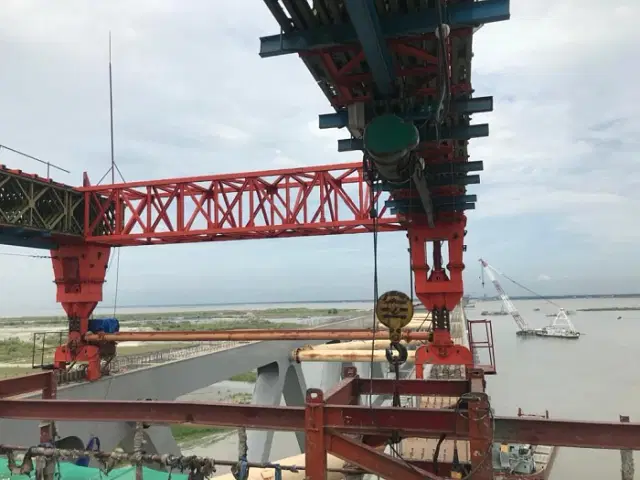
About the rise in costs, he said that some extra work had to be carried out. This will put costs up. Then against, costs dropped in some instances. One would have to wait to know the final expenditure.
Present state of construction
A visit to the construction site at Mawa on 20 September, revealed 20 spans were complete. Of another 6, some were being painted and some were being joined. It will be possible to place the 10 spans in a short period of time.
Large cranes at the Mawa construction site are used to list the spans and place these on the pillars. Bu a large crane was seen idle on a barge by at the construction site. Two officials at the site pointed to the strong and noisy current below the barge, saying that that crane was not being able to take the spans for placement due to the strong current at Mawa.
According o the project records, the first span of Padma Bridge was put in place on 30 November 2017. The next span was put in place around four months later. Towards the beginning, the spans were placed after every two or three months. Towards the end of 2018, several spans were put in place every month. Recently it has been taking the most time to put a span in place. With the river current slowing down, the authorities are planning to put another three spans in place this month.
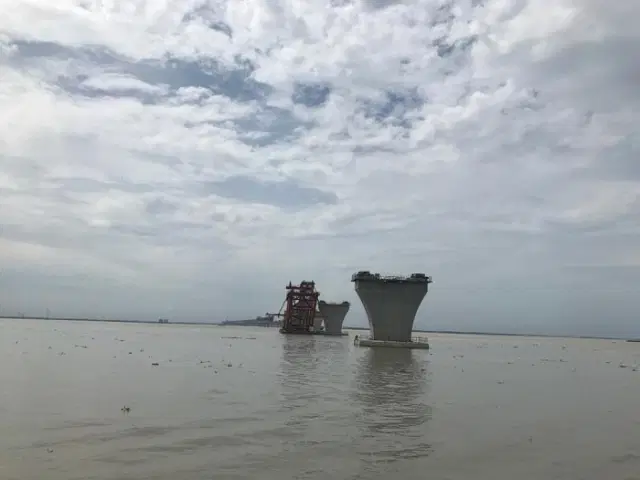
1,400 acres of char land lost
When ECNEC passed the Padma bridge project in 2007, its estimated cost was Tk 101.62 billion (Tk 10,162 crore ). In 2011 this went up to Tk 205.07 billion (Tk 20,507 crore). After the second amendment in 2016, expenditure spiraled to Tk 287.93 billion ( Tk 28,793 crore). Then without changing the project proposal, in June 2018 the costs were increased again, this time to Tk 301,93 billion (Tk 30,193 crore).
The last increase was by Tk 14 billion (Tk 1,400 crore ) due to the acquisition of 1,163 hectares of land. But that land acquired at such a high cost, is now being washed away by the floods.
Sources in the bridges division said initially around 1,500 hectares of land had been acquired on either side of the river, at a cost of Tk 2 billion (Tk 200 crore). This land was used for the Padma bridge project road, offices, houses, rehabilitation area , etc.
However, the bridge division is in trouble, similarly using char land in Shibchar, Madaripur. Local politicians of the ruling party claimed ownership of the land and stopped sand from being dumped there. The matter was even taken up at a top level of the government. Finally it was decided to buy the land, even though it will be of no use to the bridge division once the project is complete.
Speaking to Prothom Alo about the matter, project director Shafiqul Islam told Prothom Alo that there is uncertainty about the permanence of the char land. Their main purpose is to dump the sand there and they are doing that. Experts will be consulted regarding future use of the char.
Then he Bangladesh army proposed setting up a livestock farm in the char land and signed an MOU with the bridge division on 23 October last year.
Executive director of Transparency International Bangladesh (TIB), Iftekharuzzaman, speaking to Prothom Alo, said it was a waste to purchase land that would not be necessary once the project was complete. Actually, he said, the main objective in purchasing this land was to misappropriate funds. Investigations must be run to find out how public money has been squandered and shared. Those involved in this corruption should be punished.
Other possible areas of cost escalation
The contractors of the project are claiming costs for keeping their workforce on due to delays in the work. This is called management cost. The contractors of the main bridge are claiming Tk 3.9 million (Tk 39 lakh daily). The bridge division is willing to pay Tk 2.8 million (Tk 28 lakh). Negotiations are on. Even if a payment of Tk 3 million (Tk 30 lakh) is agreed upon, this will mean paying the contractors an additional Tk 2.85 billion (Tk 285 crore).
The contractors have over 300 such claims including costs for their heavy equipment lying idle in Bangladesh. These claims must be settled.
When the costs of goods go up over the years, the contractors must be paid the additional amount. That is why Tk 4 billion (Tk 400 crore) had been fixed for the purpose, but the manner in which the project work is being delayed, this amount will not cover costs, project officials think.
Former secretary and analyst of mega projects, Fouzul Kabir Khan, told Prothom Alo, delay in projects means increase in expenditure. Delaying work once the contract is signed, claiming compensation – these are all old tricks of the contractors. Experts had warned of all this in advance and now all that is happening. He said, politically influential persons are behind the contractors of the projects, so many things turn out in favour of the contractors.
This report appeared in the print and online edition of Prothom Alo and has been rewritten for the English version by Ayesha Kabir









